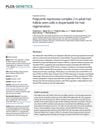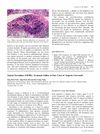 16 citations,
August 2015 in “Journal of Experimental & Clinical Cancer Research”
16 citations,
August 2015 in “Journal of Experimental & Clinical Cancer Research” The photolyase-based device significantly changed the size and heat of potential skin cancer areas in patients.
 15 citations,
January 2018 in “Acta dermato-venereologica”
15 citations,
January 2018 in “Acta dermato-venereologica” Skin treatment can lower life quality for patients with skin conditions.
 2 citations,
December 2023 in “JEADV. Journal of the European Academy of Dermatology and Venereology/Journal of the European Academy of Dermatology and Venereology”
2 citations,
December 2023 in “JEADV. Journal of the European Academy of Dermatology and Venereology/Journal of the European Academy of Dermatology and Venereology” The document suggests a new way to categorize skin and mind disorders into two main groups to reduce confusion.
 1 citations,
April 2023 in “Journal of the Hellenic Veterinary Medical Society”
1 citations,
April 2023 in “Journal of the Hellenic Veterinary Medical Society” Most dogs with paw inflammation had chronic issues, often due to allergies, and certain breeds were more affected.
September 2016 in “Toxicology letters” The 5050 MHA42MCS45 hydrogel blend is suitable for repairing load-bearing soft tissues.
 6 citations,
February 2023 in “Journal of the American Academy of Dermatology”
6 citations,
February 2023 in “Journal of the American Academy of Dermatology” Upadacitinib improved hair regrowth and quality of life in alopecia areata patients with minimal side effects.
 6 citations,
December 2021 in “PLoS Genetics”
6 citations,
December 2021 in “PLoS Genetics” Polycomb Repressive Complex 2 is not needed for hair regeneration.
 41 citations,
March 2007 in “Journal of dermatological science”
41 citations,
March 2007 in “Journal of dermatological science” Taking L-cystine and vitamin B6 can prevent hair loss caused by smoke in mice.
![Influence of FHIT on Benzo[a]pyrene-Induced Tumors and Alopecia in Mice: Chemoprevention by Budesonide and N-Acetylcysteine](/images/research/f8f56777-f891-4879-8c45-c87d6aa82563/small/35499.jpg) 24 citations,
May 2006 in “Proceedings of the National Academy of Sciences of the United States of America”
24 citations,
May 2006 in “Proceedings of the National Academy of Sciences of the United States of America” Budesonide and N-acetylcysteine reduced tumors and alopecia in mice, regardless of FHIT gene status.
 11 citations,
June 2012 in “Archives of Dermatological Research”
11 citations,
June 2012 in “Archives of Dermatological Research” L-cystine and vitamin B6 at high doses prevented hair loss in mice treated with a chemotherapy drug.
 9 citations,
October 2008 in “Mutation research”
9 citations,
October 2008 in “Mutation research” N-acetyl-L-cysteine (NAC) can prevent DNA damage and protect cells from harm.
 April 2023 in “Journal of Investigative Dermatology”
April 2023 in “Journal of Investigative Dermatology” Skin cells and immune cells change in a skin condition called hidradenitis suppurativa, and a certain treatment can improve these changes.
 82 citations,
August 2017 in “Cell Reports”
82 citations,
August 2017 in “Cell Reports” An imbalanced gut and lack of biotin can cause hair loss in mice.
 78 citations,
September 2006 in “International Journal of Cosmetic Science”
78 citations,
September 2006 in “International Journal of Cosmetic Science” Dandruff is mainly caused by a scalp reaction to yeast, can worsen hair loss, and antifungal treatments may help.
 17 citations,
August 1967 in “JAMA”
17 citations,
August 1967 in “JAMA” The rapid corticotropin test is a quick and simple way to diagnose adrenal insufficiency.
 14 citations,
December 2007 in “Pediatric allergy and immunology”
14 citations,
December 2007 in “Pediatric allergy and immunology” Newborns with the common rash Erythema Toxicum have many active mast cells in their skin, but these cells don't produce the LL-37 peptide.
 7 citations,
November 1977 in “JAMA”
7 citations,
November 1977 in “JAMA” A woman got a serious strep infection from an IUD, likely passed from her husband's infected throat during sexual activity.
 August 2014 in “Springer eBooks”
August 2014 in “Springer eBooks” Certain gene mutations can weaken the skin barrier and, when combined with environmental factors, lead to eczema and severe itching.
 205 citations,
July 2009 in “Journal of Dermatological Science”
205 citations,
July 2009 in “Journal of Dermatological Science” Male and female skin differ in many ways, which could lead to gender-specific skin treatments.
 134 citations,
January 2019 in “American journal of clinical dermatology”
134 citations,
January 2019 in “American journal of clinical dermatology” Antibiotics can reduce acne but may lead to resistant bacteria, and understanding the skin's bacteria is important for treatment.
 89 citations,
May 1999 in “Allergy”
89 citations,
May 1999 in “Allergy” The yeast Pityrosporum ovale can cause skin allergies and infections, and antifungal treatments like ketoconazole are effective against it.
 66 citations,
October 1984 in “Annual Review of Microbiology”
66 citations,
October 1984 in “Annual Review of Microbiology” Toxic Shock Syndrome cases increased due to new factors, but decreased with public health measures and changes in tampon use.
 37 citations,
January 2013 in “Postepy Dermatologii I Alergologii”
37 citations,
January 2013 in “Postepy Dermatologii I Alergologii” Isotretinoin effectively reduces acne but causes dry skin, higher skin pH, more redness, and hair loss.
 29 citations,
May 2020 in “npj Regenerative Medicine”
29 citations,
May 2020 in “npj Regenerative Medicine” Immune cells help regulate hair growth, and better understanding this can improve hair loss treatments.
 26 citations,
January 2017 in “Journal of Clinical Pediatric Dentistry”
26 citations,
January 2017 in “Journal of Clinical Pediatric Dentistry” Dental erosion is common in adolescents and is linked to diet and higher socioeconomic status.
 21 citations,
June 2013 in “European journal of pharmaceutics and biopharmaceutics”
21 citations,
June 2013 in “European journal of pharmaceutics and biopharmaceutics” The nanoparticle-emulsion with polihexanide is more effective and lasts longer for skin antisepsis.
 19 citations,
September 2002 in “Acta dermato-venereologica”
19 citations,
September 2002 in “Acta dermato-venereologica” Topical tacrolimus did not regrow hair in alopecia universalis patients.
 17 citations,
June 2010 in “Journal of Cosmetic Dermatology”
17 citations,
June 2010 in “Journal of Cosmetic Dermatology” Many women with hard-to-treat acne also have PCOS.
 14 citations,
April 2014 in “International Journal of Cosmetic Science”
14 citations,
April 2014 in “International Journal of Cosmetic Science” Acne is caused by multiple factors including oil production, bacteria, inflammation, and possibly diet and environment.
 11 citations,
February 2021 in “Biomedicines”
11 citations,
February 2021 in “Biomedicines” Bacteria in our hair can affect its health and growth, and studying these bacteria could help us understand hair diseases better.








![Influence of FHIT on Benzo[a]pyrene-Induced Tumors and Alopecia in Mice: Chemoprevention by Budesonide and N-Acetylcysteine](/images/research/f8f56777-f891-4879-8c45-c87d6aa82563/small/35499.jpg)




















